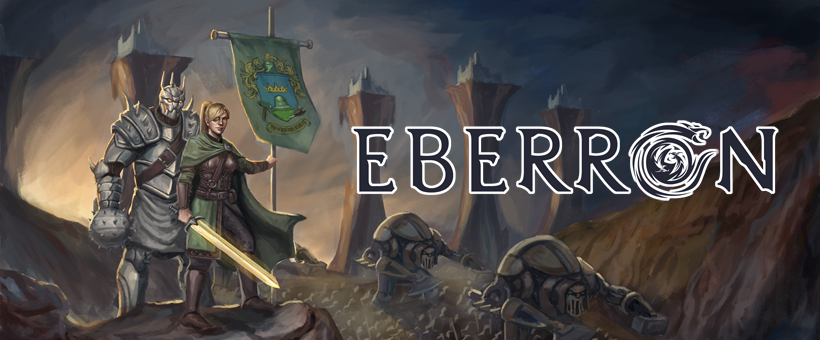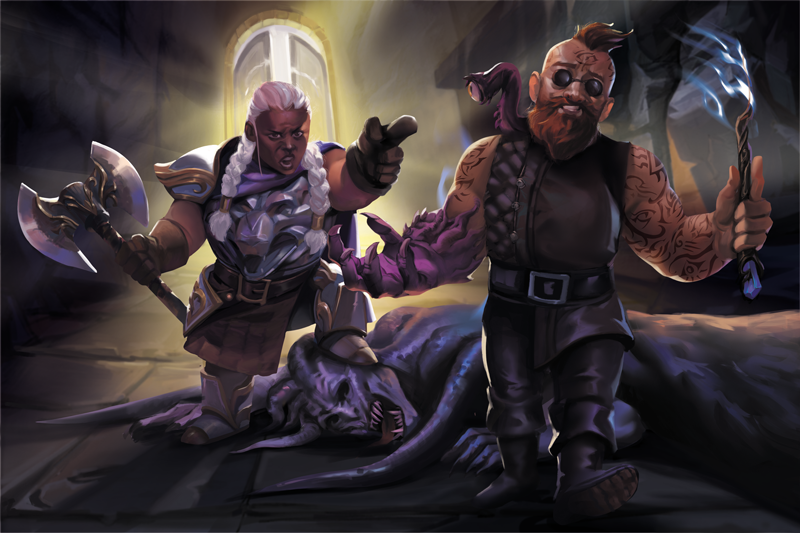
I’m still busy working on Exploring Eberron, but I like to take time to answer questions from my Patreon supporters when I can. Today’s question comes from Reighndragon:
How far do the dragonmarked houses involve themselves in national politics? How do they view the restrictions imposed on them by the Korth Edicts? In specific: Is it possible for a dragonmarked gnome of House Sivis to take a seat in the advisory council of the king of Q’Barra? Would House Lyrandar be inclined to send an airship for the Aundairian army to perform a paratrooper invasion of Thaliost?
First of all, I suggest reviewing this article for a deeper look at the houses overall, including a discussion of the Korth Edicts. Let’s look at the basic points.
- The houses are first and foremost BUSINESSES. They are interesting in making a profit.
- They do business with and have holdings in most of the nations of Khorvaire.
- In many cases—especially Sivis and Kundarak—their business depends on their customers believing that they are neutral, reliable forces. If it was revealed that House Sivis was sharing all its data with the Royal Eyes of Aundair, it would be a disaster for the house.
So this is a simple equation: What does a house gain from getting involved in politics, and what does it have to lose? In the long run, will this help its profits, or hurt them? Let’s look at the two examples.
Can a Sivis gnome take a seat on the advisory council of the King of Q’barra?
Certainly. This doesn’t even violate the Korth Edicts, which prevent a member of a dragonmarked house from owning land, holding a noble title, or maintaining an army. If a King wants ADVICE, where’s the harm in that? Corporations in our world hire lobbyists and get included on advisory boards all the time. The only reason it would be a problem is if word got out that this advisor was sharing Sivis customer secrets; if that were to happen, I would expect the advisor to be very publicly excoriated from the house, and possibly be faced with more severe punishments for scarring the reputation of the house.
A quick point of comparison is Valenar. House Lyrandar essentially runs the administration of the nation on behalf of the Tairnadal. But they don’t actually hold noble titles or own the land; it’s a simple arrangement where they do work the Tairnadal don’t want to do, while allowing them to create opportunities for Khoravar immigrants. But here’s the big thing: they don’t give the Tairnadal free shipping. Their administrative work is a separate business transaction; but if the Tairnadal want to use Lyrandar airships, they pay just like anyone else. Which brings us to the next question…
Would House Lyrandar be inclined to send an airship for the Aundairian army to perform a paratrooper invasion of Thaliost?
House Lyrandar is a BUSINESS. They can and did provide transport services to ALL nations during the war. The opening of my novel City of Towers involves a Cyran force defending against an airship attack. But that isn’t a political move on the part of Lyrandar, because they serve anyone who can pay for the service. So sure, they’d allow Aundair to charter an airship for their paratroops, and then they’d let Thrane charter a ship for its counter attack. They aren’t choosing a side; they’re selling their services to anyone with the gold.
Now, COULD they decide to take sides and offer their services to Aundair for free? Sure, they could, but WHY? How does this help their bottom line, when it invites distrust and possible retaliation from the rest of the Five Nations? Their neutrality is their shield and maximizes their profits; once they choose sides, they are narrowing their markets. Why is this a sound business decision? What is Aundair offering that’s worth risking their business? We’ve called out that Aurala is friends with the Matriarch of the house, and Aurala could offer them a second grant like Stormhome (which ALSO violates the Edicts…). But essentially, why wouldn’t they just ask Aundair to PAY for the ship? Aurala can definitely afford it, and that’s what Lyrandar does.
So: at the end of the day, houses are going to make their choices driven by profit. At the moment, they work with anyone willing to pay for their services. They definitely can and will do favors for allies—see House Jorasco’s ties to the Boromar Clan in Sharn—but that is always measured on the balance of will this help our hurt our profits? Now let’s hit one more part of the question…
How do they view the restrictions imposed on them by the Korth Edicts?
Again, check out this article for a deeper look at this question. One of the key story elements of Eberron is the idea that it may no longer be possible to enforce the Korth Edicts. If Breland makes a Deneith heir a duke, who’s actually going to do something about it? Queen Aurala’s consort is a Vadalis heir, and though he holds no title it’s pretty sketchy. The Korth Edicts worked when Galifar was united; now, it’s possible no single nation can enforce them, and we’ve called out examples of houses that ARE pushing against them. One concrete example is House Tharashk; in brokering the services of Droaamite services, they are likely breaking the “no armies” clause. But who’s going to try to stop them… especially when everyone wants to hire their monster mercenaries? So again, it’s all about will this help or hurt their profits?
The other big thing people often forget about the Korth Edicts is that they weren’t simply a burden on the houses; they were an opportunity. Essentially, they were a deal with Galifar: If the houses agreed not to challenge him politically (no titles of nobility) or militarily (no land, no armies) he wouldn’t challenge them economically. The houses hold monopolies on a scale that’s illegal in the US today, and under the Edicts they regulate their own industries. So they don’t particularly want to throw out the Edicts, because for House Sivis, the lack of antitrust laws is far more important to their bottom line than being able to have a noble title. This ties to one last question that came up in another discussion. Paraphrased…
My character was hired by House Cannith to do a job that involved me being locked in a room with no way to leave. While I was doing this job, a bunch of cultists teleported in and because I couldn’t leave, my friends and I were nearly killed. Can I sue Cannith for negligence? And if I do, would they be more likely to settle or to do something dramatic like assassinate me?
The good news is that they probably wouldn’t assassinate you. The bad news it that it’s because you don’t have a case. There’s no worker protection laws in Eberron. The Korth Edicts specifically protect the nobility—the houses can’t raise armies against them or create rival kingdoms—but they aren’t about protecting the commoners. On the contrary, the Edicts specifically lay the foundation for the house monopolies. This is far more like The Jungle than the world we live in today. Having said that, this isn’t to say that they houses are intentionally careless with the lives of their employees, especially heirs of their own house; part of being family businesses is that they don’t want their own children to die. If a Lyrandar heir is injured on the job, they likely will be taken care of. But this is driven by their own self-interest, not the law; and if a random “adventurer” is hurt while working for them… isn’t that why they call them adventurers?
Now: I said they wouldn’t assassinate you… which is BECAUSE you have no case. If you did, or at least were posing some other sort of threat to them? Then it’s at least on the table. We’re back to that original question: how will this affect their bottom line? Are you a hero whose actions matter and whose death would be noticed? Do they NEED to assassinate you, or can they just threaten you? Slander you? Buy your company and have you fired? We’ve said before that the houses will do terrible things to maintain their power. The question is always back to the balance sheet; how much are you going to cost them, and what’s the best way to minimize that number? It’s also definitely the case that some houses are worse than others, and that ultimately it will come to who’s in charge of the region. I think the majority of Lyrandar heirs would be horrified at the idea of their house sanctioning assassination. But Calynden d’Lyrandar, the Kraken of Stormreach? That dude has Thuranni on speed dial.
To be clear: this is a terrible terrible situation… and that’s the point. Overall, the houses are amoral corporate entities driven by profit and possessing potentially unchecked power. Because one of the other core principles of Eberron is that it’s a world that needs heroes. Some heroes fight demons; others battle corrupt corporations. Which story do you want to explore? Note that if it’s a story you DON’T want to explore, you can push a more positive view of the houses. But the current situation is intentionally imperfect.
Why did the Twelve permit Cannith to agree to the shutting down of the creation forges in the Treaty of Thronehold? Beyond producing warforged it seems like that is a huge hit to their ability to produce goods on a massive scale.
Excellent question, and also discussed in the other linked article. Here’s the factors.
- The Treaty of Thronehold represented a rare moment of unity. The reason the Korth Edicts are difficult to enforce is because no one nation can enforce them alone. This was a demand made by ALL THE NATIONS.
- House Cannith’s leadership and its major operations were lost in the Mourning, and the house is STILL reeling from that blow. Starrin d’Cannith, the patriarch lost in the Mourning, might well have found a way to counter the demand. But as of the Treaty of Thronehold, Cannith doesn’t even HAVE a patriarch.
- The warforged are seen as weapons. Most nations were uncomfortable with Cannith having the capability of producing its own private army of constructs, given that the war was now over. The recognition of warforged as sentient, free beings was a further nail in this coffin: It could be seen as violating both the Korth Edicts (no house armies) AND the Code of Galifar (no slaves).
- Last but not least: Cannith had always dominated the Twelve. Many of the other houses were HAPPY to see Cannith taken down a peg. So they weren’t fighting as fiercely as they might have against other restrictions.
Bear in mind, the creation forges are NOT the primary tool that Cannith uses for mass production of mundane goods; they have other eldritch machines and focus items that assist general mass production. Rising From The Last War specifically identifies the forges as producing warforged (page 280) while the Eberron Campaign Guide says “These enormous contraptions… are designed to churn out mechanized soldiers.” They were also used to produce titans and homunculi, but again, they WEREN’T the be-all end-all of Cannith’s production facilities, and there are “Forgeholds” that don’t have creation forges.
So this article paints the Dragonmark Houses in a bleaker and more corporate light than most… but they’re definitely not monolithic. So I’m curious as to which of the Houses you think is more willing to incidentally hurt people on their way to profit (aka less empathy), versus those with more empathy involved in their methods.
This is a good question. I am presenting the houses in a harsh light here, because the point is that they could do terrible things if they chose. The theme we wanted to explore with them from the start is that in the wake of the Last War, are the houses more powerful than nations? But the fact that there are few checks on their power isn’t supposed to make them monsters. The idea is that over centuries, most people have come to trust and rely on the houses, because they’ve been reliable. You believe that Sivis will keep your secrets safe, that Kundarak protects your goods, that you’ll get the best sword at a smith with the Cannith seal and you won’t get food poisoning at the Ghallanda inn. I call out that they regulate their own industries as a sign of the power they possess; but the twist is that they actually DO regulate their own industries. There’s tremendous potential for abuse, but that doesn’t mean it’s common. In general, MOST PEOPLE view the houses as reliable businesses, not as terrifying corporate tyrants. It’s just that, again, they DO have unchecked power and COULD abuse it… and what happens if and when they do?
So the question is: What houses are willing to hurt people in the name of profit? Which generally lack empathy? As the question notes, houses aren’t monolithic. So I’ll call out that I think Cannith is near the top of the “low empathy” list. During the war they manufactured weapons for all sides, and they essentially created a slave race that they threw onto the front lines of that war. On the other hand, I’ll note that Aaren d’Cannith—the creator of the modern warforged—left the house in protest of the treatment of the warforged. Of the current Cannith contenders I’d say that Jorlanna is probably the best of them; both Zoraln and Merrix are pretty ruthless.
So Cannith is up there. Thuranni surely is as well; it’s a house who’s specialty IS assassination. Calynden may make the order, but it will be a Thuranni heir who actually fires the crossbow. Phiarlan is somewhat better, and again, there are a significant number of Phiarlan heirs who truly believe in the ARTISTIC mission of the house and don’t work with the Serpentine Table.
I’d put Vadalis on the low-empathy side, as well. They are essentially about manipulating animals for the benefit of humanity, and I don’t think PETA would approve of their methods. Sivis is tricky because they definitely place the APPEARANCE of neutrality as paramount… but they’re also Zil gnomes, so they live in a society that embraces the idea of assassination as an acceptable tool in pursuit of the greater good. I tend to think of Sivis as one of the nicer houses, but in part that’s because they DON’T have a lot of competition; if something came up, we’d likely see a darker side pretty quickly.
So which are the nicest houses? I think Kundarak is pretty much what it says on the can: they are honest folk who want to keep your stuff safe for you. Ghallanda is literally in the business of hospitality, and their name means “The Helpful Hound That Appears Where Needed The Most”; i think they are the most inclined to offer empathy and even charity when called for; at the end of the day, I think Ghallanda likes people. I think Medani is a reasonably empathetic house and tries to do what it feels is right, which is also why they’re one of the less influential houses. I tend to think that Orien is another house that basically just tries to provide a useful service; they haven’t tried to destroy Lyrandar’s airship business…. yet.
The others all fall in the middle. I think Lyrandar is generally a friendly house. But if someone started developing airships anyone can fly? People like Calynden would go to great extremes to eliminate that threat. Individual Tharashk inquisitives can be great, but the house as a whole is very ambitious. Jorasco is very complicated, and discussed at more length in the article linked earlier; there are many Jorasco HEIRS who are driven by empathy and want to help however they can, but there’s also ruthless people determined to ensure that the house thrives as a business.
I’m going to stop there, because this has already gone on WAAAY too long for an IFAQ. BUt the ultimate answer is this: The houses are as ruthless and frightening as you want them to be. The framework is there to run a campaign in which the houses are ruthless dystopian megacorporations, and it’s questionable who could stop them if they go in that direction. But you CAN also just focus on them as reliable service providers, and just ignore the lack of outside oversight or labor laws.
Thanks again to my Patreon supporters! Per the latest Patreon poll, the next major article will explore Dolurrh, the Realm of the Dead!




